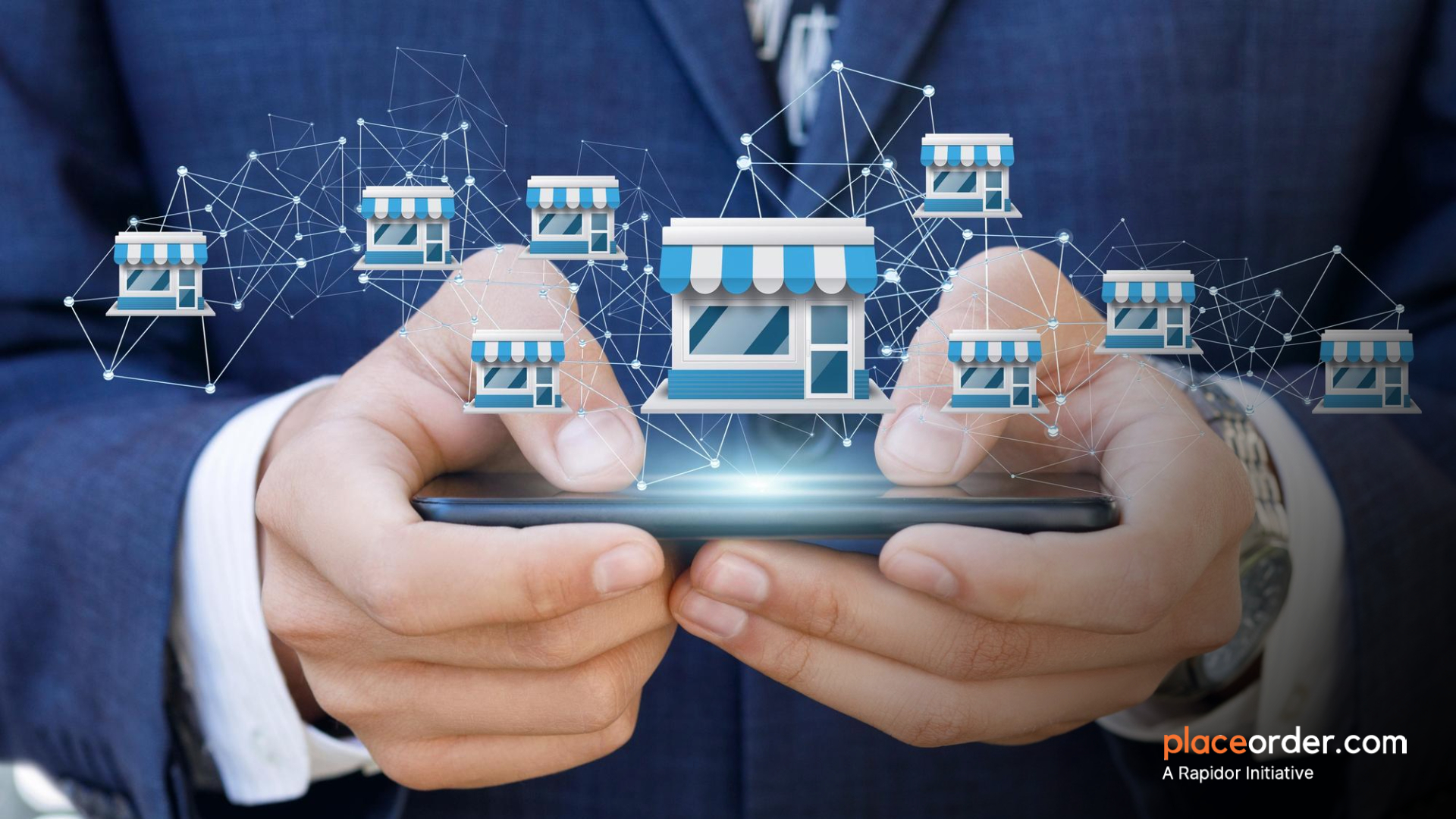In an era where digital transformation in retail is a necessity, retailers are increasingly looking towards innovative solutions to stay ahead in a rapidly evolving marketplace.
This shift towards digitalization is reshaping the retail landscape, altering how businesses operate, interact with customers, and manage their day-to-day activities. Amidst this transformation, one of the most significant game changers for retailers has been the adoption of B2B apps for retailers.
These applications are catalysts of change – driving efficiency, customer engagement, and overall growth.
The purpose of this blog is to guide retail business owners and operations managers through the transformative journey of integrating B2B retail apps into their business models. As the retail sector grapples with challenges, such as inventory management, customer relationship management, and adapting to the digital marketplace, B2B retail apps emerge as a powerful solution.
They offer an unprecedented opportunity to streamline operations and enhance customer experiences and drive sales growth. This blog aims to be your compass in navigating the vast landscape of digital transformation in retail.
We’ll be spotlighting how B2B retail apps can be the cornerstone of your business’s evolution and success.
Understanding the Pain Points of Retail Business Owners: What Do They Deal With?
Efficient management of inventory and supply chain is a cornerstone of successful retail operations.
Retail business owners often find themselves in a constant battle to balance inventory levels, ensuring they’re neither overstocked nor understocked.
The complexity of tracking stock across multiple channels, coupled with unpredictable supply chain fluctuations, can lead to significant operational headaches.
In the digital age, where customer expectations for fast and accurate service are high, these challenges are amplified. B2B apps for retailers come into play here, offering integrated solutions for real-time inventory tracking and supply chain management.
This proves crucial for maintaining operational fluidity and customer satisfaction.
Customer Engagement in the Digital Realm
In today’s digital-first world, engaging customers effectively online is critical for retail business growth.
However, transitioning from traditional in-store interactions to digital customer engagement can be daunting. Retailers face the challenge of creating personalised, meaningful interactions through digital channels.
The shift to e-commerce for retail necessitates is an online presence and a strategy to captivate and retain the digital customer. Retailers must leverage digital tools to create immersive online experiences that resonate with their customers, fostering loyalty and repeat business.
Digital Adaptation Challenges
Adopting digital tools and platforms presents a significant hurdle for many retail businesses, especially small to medium-sized ones.
The digital transformation in retail requires a financial investment and a cultural shift within the organisation. Retailers often struggle with choosing the right technology that aligns with their business model and customer needs.
The process of integrating new digital solutions with existing systems can be complex and time-consuming, requiring both technical know-how and strategic planning.
Data Analysis and Utilisation
In the age of information, data is king. Yet, one of the most significant pain points for retailers is collecting, analysing, and utilising data to make informed business decisions.
Retailers gather vast amounts of data through customer interactions and transactions. However, the challenge lies in effectively analysing this data to glean insights into customer behaviour, market trends, and operational efficiencies.
Retail operations management must navigate through this data deluge to extract actionable insights that can drive strategic decisions and foster business growth.
Choosing the Right B2B Retail Apps for Your Business: How to Go About it?
In the quest for digital transformation in retail, selecting the right B2B apps for retailers is pivotal.
With an array of options available, it’s crucial to choose applications that not only meet your specific business needs but also align seamlessly with your long-term objectives.
Criteria for Selecting Apps That Meet Specific Retail Needs and Objectives
When choosing B2B retail apps, start by identifying your core retail business transformation goals.
Are you looking to streamline your inventory management, enhance customer engagement, or expand your digital marketing strategies?
It’s essential to select apps that offer specific features aligned with these objectives. For instance, if inventory management is your primary concern, look for apps that provide real-time tracking and predictive analytics.
Tips for Evaluating App Features and Compatibility with Existing Processes
Evaluating the features of a B2B retail app requires a keen understanding of your operational workflow.
A Gartner study suggests that most retailers cite compatibility with existing systems as a key factor in technology adoption. Ensure that the app integrates smoothly with your current systems to avoid disruptions in your operations.
It’s also wise to check for scalability – as your business grows, your app should be able to keep up.
Another crucial aspect is user-friendliness. An app with a steep learning curve can lead to resistance among your team. Look for intuitive interfaces and check if the app provider offers adequate support and training.
Lastly, consider the security features of the app. With increasing digital transactions, safeguarding customer data is paramount. Opt for apps that adhere to stringent data security protocols and comply with industry standards.
Streamlining Operations with B2B Retail Apps
The integration of B2B apps in the retail sector has revolutionised the way inventory and supply chain processes are managed. Hence, it has ushered in an era of efficiency and precision that was previously unattainable.
These digital tools are redefining operational methodologies for enhanced productivity and customer satisfaction.
B2B apps for retailers have been instrumental in optimising inventory management, a critical component of retail operations. According to a study by the Aberdeen Group, companies with optimised inventory management have a higher fill rate and shorter cash-to-cash cycle times than those without.
This optimization is primarily achieved through real-time tracking and data analytics capabilities of B2B retail apps. They provide accurate, up-to-the-minute information on stock levels, enabling retailers to make timely decisions on restocking, thereby reducing instances of overstocking or stockouts.
Furthermore, these apps play a significant role in refining supply chain processes.
A report by McKinsey highlights that advanced supply chain management tools can reduce transportation costs by up to 15% and increase inventory turns by 35%.
B2B retail apps contribute to these improvements by offering features like automated order processing, tracking shipments in real-time, and predicting supply chain disruptions. This ensures the timely delivery of products and helps maintain a lean and cost-effective supply chain.
Enhancing Customer Engagement Through Digital Tools: Why is it Necessary?
Retail apps, especially B2B retail apps, are playing a crucial role in fostering stronger, more personalised relationships with customers.
By leveraging the capabilities of these digital tools, retailers are able to offer experiences that are satisfying and deeply resonant with their customers’ needs and preferences.
A key strategy for using B2B apps for retailers to enhance customer engagement is personalization. According to a report by Epsilon, 80% of consumers are more likely to make a purchase when brands offer personalised experiences.
B2B retail apps facilitate this by gathering and analysing customer data to provide insights into buying patterns, preferences, and behaviours. This information enables retailers to tailor their offerings and communications, making each customer feel valued and understood.
Another strategy is the integration of omnichannel experiences. A study by Harvard Business Review found that omnichannel customers spend an average of 4% more in-store and 10% more online than single-channel customers.
Retail apps can bridge the gap between online and offline channels, providing a seamless shopping experience.
Whether it’s allowing customers to check inventory in real-time, offering flexible pick-up options, or providing personalised recommendations, these apps ensure that every interaction is consistent and cohesive across all channels.
Moreover, B2B retail apps enhance customer engagement through improved customer service. Features like real-time support and efficient issue-resolution mechanisms can significantly elevate the experience.
Leveraging Data for Informed Business Growth
B2B retail apps are rich sources of data that can drive strategic decision-making and market trend analysis.
The role of app-generated data in strategic planning is monumental. A report from McKinsey & Company indicates that data-driven organisations are 23 times more likely to acquire customers and 19 times more likely to be profitable.
Retail apps gather comprehensive data points – from customer behaviour and purchasing patterns to inventory turnover rates. This wealth of information, when analysed, can reveal insights into customer preferences, potential market opportunities, and areas of improvement in the supply chain.
Retailers can then use these insights to tailor their marketing strategies, optimise inventory levels, and enhance customer experiences.
Moreover, in the context of e-commerce for retail, app-generated data plays a pivotal role in understanding and adapting to market trends.
Retail apps provide real-time data that can help in identifying emerging trends, enabling businesses to stay ahead of the curve. This could mean adapting to new consumer preferences, adjusting pricing strategies, or even anticipating and preparing for market shifts.
The utilisation of data from B2B apps for retailers also extends to personalising the customer journey. As per Salesforce’s State of the Connected Customer report, 72% of customers expect companies to understand their needs and expectations.
By analysing data from retail apps, businesses can personalise the shopping experience for each customer, leading to increased satisfaction and loyalty.
Integrating Effective Digital Marketing Strategies
B2B retail apps offer a unique platform for retailers to deploy digital marketing strategies, leveraging the digital transformation in retail to reach a wider audience and drive sales.
One of the key ways B2B retail apps aid in digital marketing is through targeted marketing campaigns. With the wealth of data available through these apps, retailers can create highly personalised marketing messages.
According to a survey by Accenture, 91% of consumers are more likely to shop with brands that provide relevant offers and recommendations. Retail apps enable businesses to analyse customer preferences and shopping habits, allowing for tailored promotions and advertisements that resonate with the target audience.
Charting a New Course in Retail with B2B Apps
The journey towards digital transformation in retail is both exciting and essential.
We’ve explored how B2B retail apps are pivotal in streamlining operations, enhancing customer engagement, and leveraging data for strategic decision-making.
These apps address the key pain points in retail business transformation and open new avenues for growth and efficiency.
As we move further into the digital age, embracing B2B apps for retailers becomes not just an option, but a necessity for success. This integration marks the beginning of a new, more dynamic course in retail, one where digital tools are at the forefront of innovation and growth.
Navigating The Transformative Power of B2B Retail Apps
We’ve unveiled how these tools can revolutionise inventory management, customer engagement, and strategic data utilisation, steering retail businesses towards unprecedented growth and efficiency.
Now, it’s your turn to take the helm. We encourage you to explore the vast potential of B2B apps for retailers and harness their capabilities to redefine your retail business.
Embrace these digital solutions to not just adapt, but thrive in the evolving retail landscape. The future of retail is digital – be a part of this exciting transformation.

